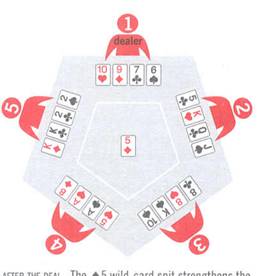Progressive Jackpots
Progressive Jackpots is played exactly like Jackpots until a deal is passed out. While the deal still passes to the next player, and the ante is repeated, the next player, and the ante is repeated, the next deal become Queen pots, wherein a pair of Queens or better is required to open the betting. Should the deal be passed out again, a pair of Kings is required, and if this is not achieved, the next deal requires a pair of aces. After Aces, the requirements to open drops it goes to Kings, then Queens, then Jacks, then back to Queens, Kings, aces and so on back and forth.
Split in the Ocean
There are many variations of Split in the Ocean. The distinguishing feature of the game is that the players are dealt four cards each face down, and a final card is then placed face up in the center of the table. This card is the spit, and it is regarded as the fifth card in each players’ hand.
However, this card, and the three others in the pack of the same rank, is regarded as a ‘wild’ card. This means that each player can regard the spit as whatever card he wishes. For example, a player who is dealt ♣ A, ♣ K, ♣ J and ♣ 10, in effect holds a royal flush, the highest hand in most forms of poker, because whatever the split, he can regard it as the ♣ Q.
The hands of all players in spit in the Ocean therefore consist of the four cards dealt them, plus one wild card. However, since all cards of the rank of the spit are wild, a player might hold two wild cards in his hand, or even three.
It is vital in games of spit for the poker players to agree before hand how wild cards are to be evaluated. The general rules is that a wild card can’t be used to duplicate a card already held in the hand, thus a hand of five of a kind would be impossible. In the absence of official rules for the game, this is recommended as best procedure. However, there are players who prefer to allow a hand of five of a kind and other hands that are impossible without wild cards.
Players ante before the deal as usual. There is usually only one betting interval. First to speak is the player on the dealer’s left, and he has the same options as in the standard form of Draw Poker, i.e. initially to check or bet, and after betting commences to call or raise or fold. When bets are equalized, the showdown takes place.
EXAMPLE SPIT IN THE OCEAN HAND
The ♦ 5 in the center of the table is the spit. Player 1 is dealer, there are five chips in the pot and it costs two chips to bet, with a maximum raise of five.
Betting interval
FIRST BETTING ROUND
- Player 2 is in the lucky position of holding a second wild card as his ♣ 5 is the same rank as the spit. Nevertheless the best hand he can make is an A,K,Q, J, 10 straight, not a bad hand but one not guaranteed to win at Spit in the Ocean. He decides to bet the minimum of two chips and await events.
- Player 3 has three of a kind (8s). It is not the worst hand he could have, but he decides it is not unlikely that somebody will be able to do better than three 8s and folds.
- Player 4 also has a second wild card, and has been dealt two Aces, so his hand is four Aces, almost an unbeatable hand in any form of poker, and a powerful one even in spit in the Ocean, so he calls the two and raises by the maximum of five chips, hoping that somebody might call.
- Player 5 also has an excellent hand, since with the wild card he can make a full house, beatable only by four of a kind or a straight flush. It costs him seven chips to stay in the game, but he calls.

AFTER THE DEAL The ♦ 5 wild-card spit strengthens the hands of players 2 and 4 as they both hold 5s.
SECOND BETTING ROUND
- Player 1, the last to speak as dealer, can use the wild card as an 8, and compete a straight, but in view of the level of betting so far wisely decides to fold.
- Player 2 now has the difficult choice of whether to fold, call or raise with the highest straight. There are 21 chips in the pot and he needs to put in five move in order to share a three-way showdown. The odds offered are just over 4 to 1. It is certainly not worth raising, he thinks. He can beat any other straight and three of a kind but anybody who has filled to a flush or better has him beaten. Reluctantly, but as it turns out wisely, he folds.
- There is a showdown, and player 4 wins with his four Aces, a profit of 13 chips.
As a matter of strategy it is interesting to consider what might have happened had he merely called on his first bet. Possibly no other players would have raised, in which case he would have five fewer chips. But suppose player 5, with his full house, had raised, as is probable, even by the minimum of two. Player 2 would probably have called for another 2, and then player 4 could have raised by five. If player 5 called, the pot would then be 27 chips, a profit of 17 to player 4.
